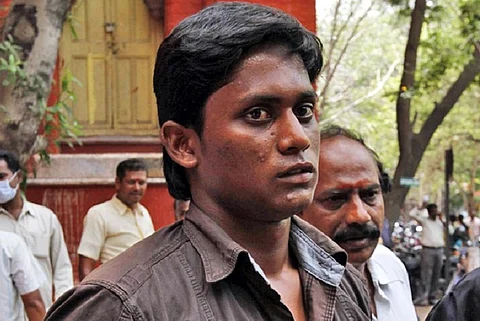

Forty-eight-year-old Elango sounded angry and dejected at the same time.
News had just come in that the Tamil Nadu CB-CID had informed the Madras High Court on Tuesday that the death of his 19-year-old son Ilavarasan, in 2013, was a case of suicide.
Following the CB-CID’s report, the Madras High Court bench comprising of acting Chief Justice HG Ramesh and Justice R Mahadevan closed the controversial case, reported Times of India.
Dalit youngster Ilavarasan and Divya’s (a Vanniyar) love story had stunned Tamil Nadu. The couple’s relationship, elopement, marriage and forceful separation, that saw caste clashes erupt in the state, ended with Ilavarasan’s body being found near a railway track in Dharmapuri.
“What should I say about this? The truth is being hidden. This was not a suicide. I have said this before and I’m saying the same thing today also. There was no reason for him to commit suicide. Police had told us years ago, that it was a suicide. What was the need for shifting the case to CB-CID? I did not get justice from the police and I went to court asking for the case to be shifted out. I will definitely go to the Supreme Court and appeal for justice. My son would never commit suicide, I will never accept that,” Elango, Ilavarasan’s father told TNM.
Ilavarasan and Divya’s story
Ilavarasan, a Dalit boy from Natham Colony, and Divya, from a neighboring village, fell in love in 2011. During the next one or two years, the couple faced many hardships. Ilavarasan was attacked once by a group of Vanniyars including Divya’s relatives.
In October 2012, the two eloped and got married. In November, caste tensions erupted in Dharmapuri after attempts to separate them through the Panchayat failed, and Divya’s father committed suicide. Riots followed the suicide, in which over 200 houses in three Dalit colonies were set ablaze.
On July 11, 2013, Ilavarasan’s body was found dead near a railway track in Dharmapuri. His death was initially recorded as a suicide, with the police stating that Ilavarasan jumped in front of the Kurla Express bound for Mumbai from Coimbatore. Days before his death, his wife Divya, who had returned to her mother’s home on June 6, had told the Madras High Court that she had no plans of returning to her husband.
But Divya said this in her fourth appearance in court; thrice before she had staunchly maintained that she was happy with her husband and wanted to return to him. The Pattali Makkal Katchi was in the forefront of the case and Divya was seen in the court flanked by their lawyers.
The High Court had transferred the probe to the CB-CID in November 2015 and had granted the team two months to finish the investigation.
Much of the police’s suicide theory hinges on a watch that allegedly belonged to Ilavarasan and was found next to his body on that fateful day. Sowmya Sivakumar in The Wire reports, “Asra Garg, who was the superintendent of police of Dharmapuri at the time, claimed that Ilavarasan’s wrist watch – recovered from the scene – had got stuck at 1.20, the very instant the train passed the spot (1.20 pm). Garg conjectured that it was the impact of the train hitting Ilavarasan that stopped the watch. This ‘fact’, in turn, has been used to ‘prove’ that the young man committed suicide by jumping in front of the train.”
However, several questions over the watch, including why Ilavarasan removed his watch before allegedly committing suicide, who placed the watch in a plastic cover and why, have far from convincing answers.
Sowmya’s report also goes on to highlight other inconsistencies in the police’s theory including that they had the audio recording of a conversation with one of the three people Ilavarasan spoke to before his death. Verbal statements of the other two friends given to the police state that Ilavarasan allegedly told them that he wanted to commit suicide. However, there is a lack of audio evidence to substantiate their claims.
'We will fight for justice'
“There is political influence in the case. To save the culprits, the CB-CID is making it a suicide case. If the government could arrest Sasikala, then this case can be easily investigated. Locally, PMK cadres have been repeatedly troubling us. Moreover, no one from our village supports us, even if I call someone 10 times, they do not help us. The village was attacked once because of us, now no one wants to help,” Elango said.
Speaking to The News Minute, S Rajinikanth, lawyer for Ilavarasan’s family said, “We have not got a copy of the CB-CID report yet, we have applied for it. So, I have not seen it. But we don't think the CB-CID did a proper investigation of the case. They would have ruled it as a suicide based on circumstantial evidence. We are going to file an appeal in the Supreme Court seeking a thorough investigation by the CBI or a special investigation team.”
“This is expected. Whether CB-CID has done a thorough investigation or not, it is clearly established that the investigative agencies are under the political establishment. This is what the political establishment wanted. Even before investigation, TN police in the district concluded that it is a suicide,” said C Lakshmanan of the Madras Institute of Development Studies. He also added, “There is hope only if the judiciary is independent of the executive and the legislature, and for the deprived sections of the society the judiciary is the only hope.”
“I will appeal in Supreme Court, I will keep fighting till I get justice for my son’s murder,” Elango says with determination.